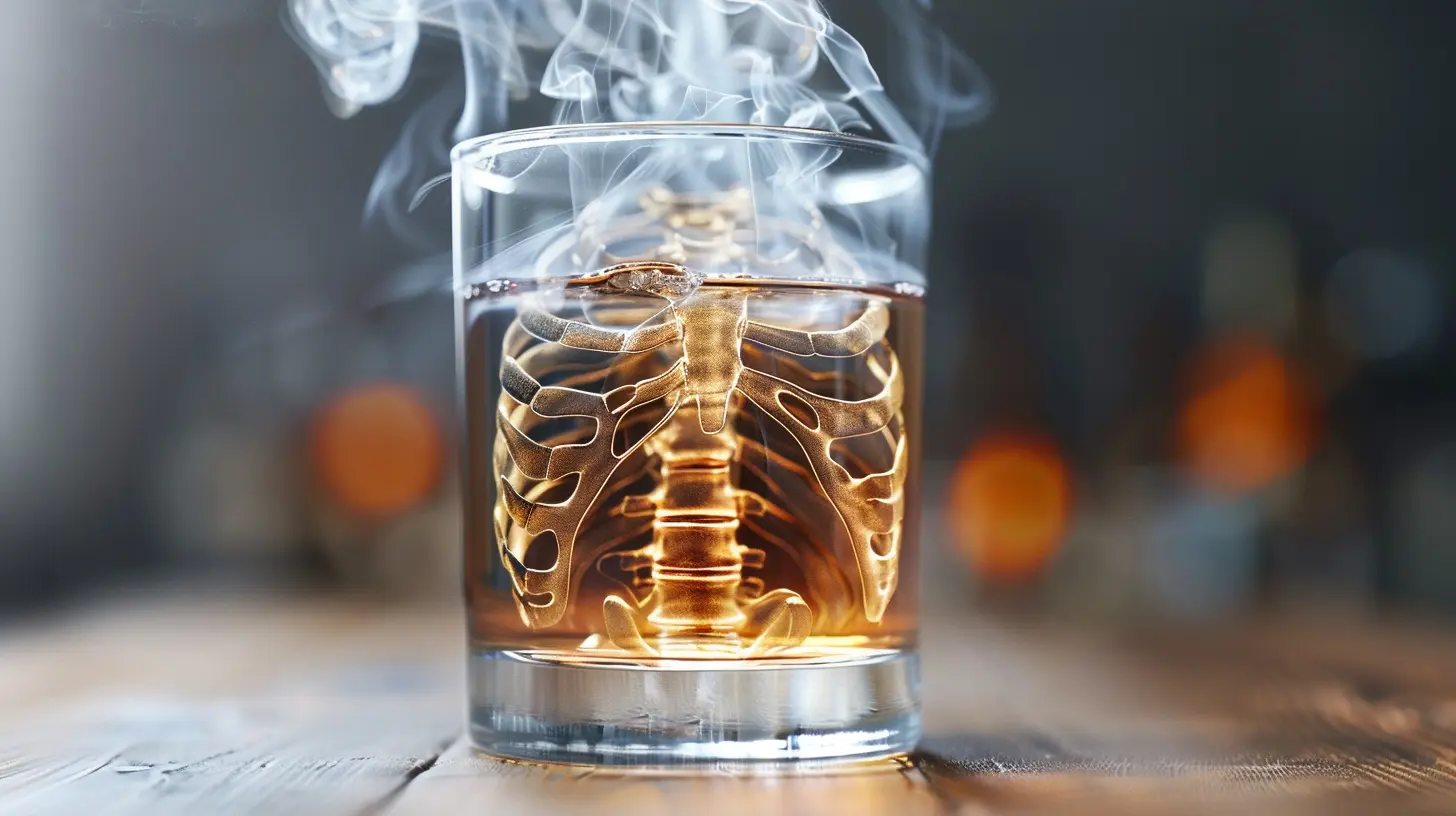4 April 2025
Bones are the foundation of our bodies. They support us, protect vital organs, and help us move. But did you know that everyday habits like smoking and drinking alcohol can silently weaken your bones over time? It’s true—the choices you make today can determine whether your bones stay strong or crumble under pressure later in life.
In this article, we’ll dive deep into how smoking and alcohol affect bone health, why it matters, and what you can do to protect your skeletal system. 
How Smoking Affects Bone Strength
Lighting up that cigarette does more harm than just damaging your lungs—it also eats away at your bone health. Here’s how:1. Reduced Bone Density
Cigarettes contain thousands of harmful chemicals, including nicotine, which interferes with bone formation. Studies show that smokers tend to have lower bone density compared to non-smokers. Lower bone density means weaker bones, increasing the risk of fractures—a big problem, especially as you age.2. Slower Healing After Fractures
Let’s say you break a bone—healing should be a natural process, right? Not for smokers. Nicotine constricts blood vessels, reducing blood flow to the bones. With less oxygen and vital nutrients reaching the injured area, fractures take much longer to heal.3. Disrupted Hormone Levels
Hormones like estrogen and testosterone play a vital role in maintaining bone strength. Smoking interferes with these hormones, leading to an increased risk of osteoporosis (a condition that makes bones fragile and prone to fractures). For women, smoking can lead to early menopause, which further speeds up bone loss.4. Decreased Calcium Absorption
Your bones rely on calcium to stay strong, but smoking reduces the amount of calcium your body can absorb. Even if you eat a calcium-rich diet, smoking makes it harder for your bones to utilize it, leaving them vulnerable to weakness.5. Increased Risk of Osteoporosis
Osteoporosis is a disease where bones become brittle and fragile. Smokers are at a significantly higher risk of developing it. Why? Because smoking speeds up bone loss, making fractures more likely, even from minor falls or bumps.
How Alcohol Weakens Your Bones
A glass of wine every now and then might not seem like a big deal, but excessive alcohol consumption can seriously damage your bone health. Here’s why:1. Weakens Bone Formation
Your bones constantly renew themselves, replacing old tissue with new. But alcohol slows down this process. Heavy drinking reduces the activity of bone-building cells (osteoblasts), meaning your bones become weaker over time.2. Robs Your Body of Essential Nutrients
Alcohol interferes with the absorption of calcium, vitamin D, and magnesium—three nutrients essential for strong bones. Without these, your bones become thin, weak, and more prone to fractures.3. Increases the Risk of Falls and Accidents
Drinking too much impairs coordination and balance, increasing the likelihood of falls. If your bones are already weak from excessive alcohol consumption, these falls can result in serious fractures, especially in older adults.4. Alters Hormone Levels
Just like smoking, alcohol messes with hormone balance. It lowers estrogen levels in women and testosterone levels in men—both of which are crucial for maintaining bone density. As a result, long-term alcohol use accelerates bone loss.5. Contributes to Osteoporosis
Heavy drinkers, much like smokers, are at a higher risk of developing osteoporosis. Excess alcohol speeds up bone deterioration, making fractures more frequent and healing more challenging.
The Double Whammy: Smoking & Alcohol Together
Now, imagine combining these two harmful habits—smoking and drinking. It’s a recipe for disaster when it comes to bone health. Both substances strip your bones of their strength, slow down the healing process, and increase the risk of fractures.If you're someone who smokes and drinks regularly, your risk of developing osteoporosis skyrockets. And if you suffer a fracture, recovery could be slow and painful. 
Who’s at the Highest Risk?
Certain groups are more vulnerable to bone loss caused by smoking and alcohol:- Women (especially postmenopausal women) – Estrogen levels drop during menopause, and habits like smoking or excessive drinking make bone loss worse.
- Older adults – Aging naturally weakens bones, and unhealthy habits only speed up the process.
- People with poor diets – If you’re not getting enough calcium, vitamin D, and other vital nutrients, your bones are already at risk. Add smoking and drinking into the mix, and the effects are even more severe.
Can Your Bones Recover?
The good news? Yes—your bones can recover, but it takes time and effort. Here’s what you can do:1. Quit Smoking
Giving up cigarettes is the best thing you can do for your bones (and your overall health). Studies show that bone health begins to improve once you stop smoking, though full recovery takes time.2. Cut Down on Alcohol
If you drink heavily, reducing alcohol intake can help prevent further bone damage. The less alcohol you consume, the better your bones can repair themselves.3. Eat a Bone-Healthy Diet
Load up on calcium-rich foods like dairy, leafy greens, almonds, and fortified cereals. Don’t forget vitamin D, which helps your body absorb calcium—spend time in the sun or take supplements if necessary.4. Exercise Regularly
Weight-bearing exercises like walking, jogging, and strength training help maintain bone density. Staying active keeps bones strong and reduces the risk of fractures.5. Get Regular Bone Density Tests
If you’ve been a long-time smoker or drinker, consult your doctor about a bone density test. This can help assess your risk for osteoporosis and guide you on further steps to protect your bones.Final Thoughts
Smoking and alcohol might seem like small indulgences, but their impact on bone health is massive. They silently weaken your skeletal system, making fractures and osteoporosis more likely. The sooner you quit smoking, reduce alcohol intake, and adopt a bone-friendly lifestyle, the better your chances of maintaining strong, healthy bones for life.At the end of the day, your bones are meant to last a lifetime—so why make choices that break them down? Take control of your habits now, and give your skeleton the support it deserves!




Zyana Harmon
Smoking and excessive alcohol consumption significantly weaken bone density, increasing fracture risk. Understanding these impacts is vital for promoting bone health and preventive strategies.
April 8, 2025 at 4:07 PM